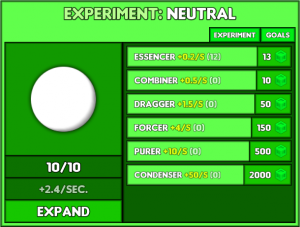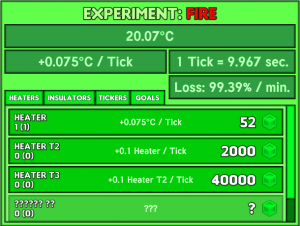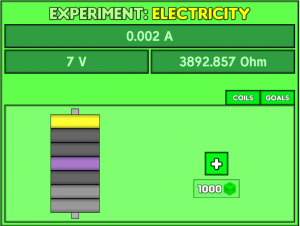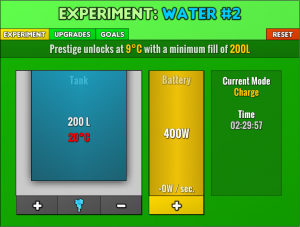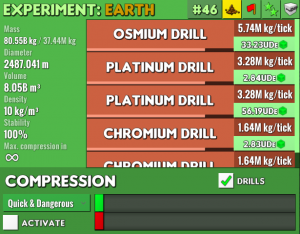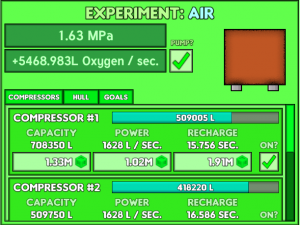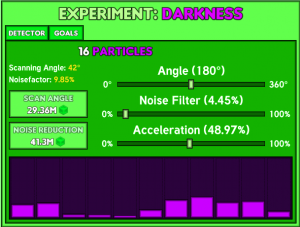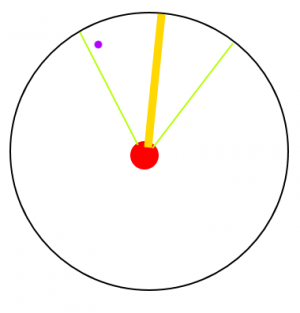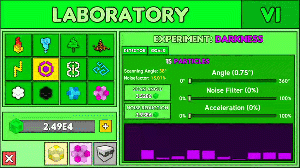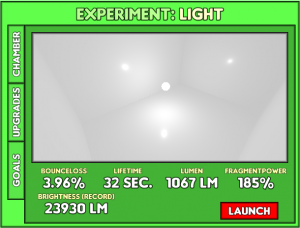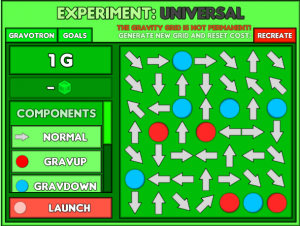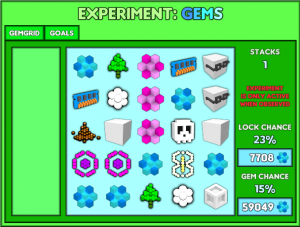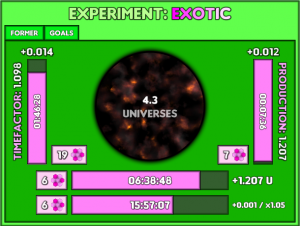Laboratory
| Laboratory | |
|---|---|
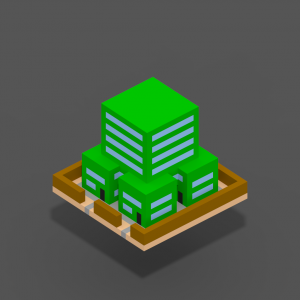
| |
| Max. Tier | 6 |
| Conversion rate | 400:1 |
| Color theme | Green |
The laboratory is a building where you perform various experiments in order to unlock modules.
Experiments unlock modules accordingly to it's respective element.
Contents
Experiments
There are 12 different experiments in the laboratory.
The experiments function as small incremental games, where the reward for progressing in them are modules and damage and resistance bonus to respective elements.
Prestiging requires a huge amount of green resources and reached a goal for respective experiment (gems and exotic can't prestige)
Prestiging gives bonuses to respective experiments which will make the experiment easier to progress.
Neutral
The goal of the Neutral Experiment is to expand a sphere.
Upgrades increases how fast the sphere grows.
Expanding converts current growth into maximum growth, which resets the sphere back to size 0.
Prestige: Prestiging resets all generators and your maximum orbs to the square root of your current maximum orbs (capped at 10) and you have to choose between 2 bonuses.
- Production x2: generators will produce orbs twice as much
- +10 max. Level (multiplicative): increases the maximum generator by 10% of previous maximum amount
Fire
The goal of the Fire Experiment is to raise the temperature gauge.
Heaters increase temperature per tick.
Tickers reduce the time per tick.
Insulators reduce the percentage of temperature lost per minute.
Upgrades of a higher tier produce upgrades of their previous tier.
Prestige: Prestiging resets the temperature, heaters, insulators, and tickers. You have to choose between 3 bonuses: Heaters, Insulators, Tickers. choosing one of these bonuses will make every manual purchases increases its effect by 1%. Multiply the maximum amount of temperature heat by 100.
Electricity
The goal of the Electricity Experiment is to raise the amperage.
Each coil (battery) starts with 1 wrap (cell), with wraps capping at 20 per coil and coils capping at 5.
Each wrap adds 1V on the coil it's on.
The total voltage is calculated with the product of voltages of all coils.
Each wrap's material can be upgraded to reduce it's resistance.
The resistance of a coil is the average of the resistances of all wraps in that coil.
Total resistance is the average of the resistances of all coils
Amperage is calculated with Voltage(V) / Resistance(Ohm)
Prestige: Prestiging resets all coils and wraps, you have to choose between 2 bonuses to prestige.
- +30% V: Increases voltage power by 30% (multiplicative)
- -20% Ohm: Reduces electrical resistance by 20% (multiplicative)
Water
The goal of the Water Experiment is to pump up to or more of a certain amount of water and then cool down said amount of water to a certain temperature..
The pump produces water.
The cooler lowers the temperature of the water.
The battery increases the power output of both the pump and the cooler, increasing their efficiency. The battery keeps on building energy over time, but also resets the energy pool when upgraded, so upgrading the battery might make things worse.
Prestige: prestige drains all the water and resets all pump, cooler, and battery to level 0. You have to choose between 2 bonuses.
- +55% Cooler Effectiveness: Cooler will reduce the temperature more quickly.
- +50% Battery Charge Speed: Battery charges faster.
Note: all bonuses are multiplicative
Nature
moved to Experiment Nature
Earth
The goal of the Earth Experiment is to get a certain amount of density.
Drills dig up earth, upgrades collect earth faster. Additional drills can be purchased. Upgrades and drills cost increase exponentially.
Compression reduces volume/diameter and raises density. Stability can be reduced depends on compression mode, if the stability depletes to 0% the experiment will be stopped and have to be resetted.
Compression modes:
- Slow & Safe: Drills get slower the higher compression rate gets (stopped at maximum rate), slow compression but won't reduce stability.
- Quick & Dangerous: Drills can continue normally regardless the compression rate, very fast compression but drains stability
- Stabilize: Only increases stability and slows down the drills.
Prestige: Prestiging resets all your drills, mass and diameter and will require you to have an amount of mass drilled and choose between 2 bonuses.
- -20% Stability loss & +10% stability gain: Reduces the stability loss when using Quick & Dangerous compression mode and Stabilize mode will increases stability more quickly
- +30% Compressor React & +5% Drillpower: Increases the compressor reaction (the compressor will reach higher compression rate faster) and increases amount of mass drilled
Air
The goal of the Air Experiment is to build up pressure inside a chamber
Compressors
Take in oxygen and force it into the chamber. You can buy multiple compressors. The upgrades for compressors are:
- Capacity: How much oxygen a compressor can hold.
- Power: How fast the compressor pushes oxygen into the tank, aka how quickly the compressor bar goes from 100% to 0%
- Recharge: How fast the compressor fills up with oxygen, as in how fast the compressor bar goes from 0% to 100%
Hulls
Increase oxygen retention rate, as in makes sure oxygen doesn't leak out.
Prestige: Prestiging resets all the compression and hulls, you have to choose between 2 bonuses to prestige.
- +20% Compression Effect: Increases the compression effect
- +10% Hull Effectiveness: increases how strong the hull is.
All bonuses are multiplicative.
Darkness
Note: the photo above is outdated. the experiment now will have a full radar with visual cone like the visual representation.
The goal of the Darkness Experiment is to find particles in the dark.
There are three sliders that help locate and find a particle:
- Radar: Rotates direction, to help directly face a particle, or get a particle within the scanning angle range. When a particle is inside the scanning angle range, the graph starts to form a smooth wave that moves from right of the graph to the left of the graph. Max height of the smooth wave is achieved when facing directly at the particle, with a smaller smooth wave the farther the particle is from exact direction. The closer the particle is the faster the wave will move.
- Noise filter: (The arrow on the left bar beside the graph). Lowers how impactful noise is on the graph, as noise is just random readings on the graph that makes finding a wave difficult. Higher noise filter may make the finding particle easier.
- Speed: Changes how fast travel speed is in a visual direction. When getting closer to a particle, the graph smooth wave gets bigger, the particle can be seen on the radar when close enough and the button will appear showing it's distance to the center. Once the particle is in reach, clicking the button collects the particle. Neglecting to capture the particle results in moving past the particle and getting out of range.
There are two upgrades to help find a particle:
- Scan angle: Increases the search angle for a particle, allowing for more accuracy with using the angle slider.
- Noise reduction: Reduces base noise, not affecting the smooth wave at all.
Prestige: Once you have collected an amount of particle, prestiging will be available, Prestiging will resets all upgrades and reduces the particle by an amount required to prestige. There are 4 bonuses to choose to prestige.
- Change-Upgrade: Increases the chances to get more particles. Chances trigger independently upon collecting and the reward is being multiplied. (for example: when dual, tri, and quad-particle is triggered at the same time, you will get (2 x 3 x 4) = 24 particles.
- Radar (Radius): Increases the radar visual distance by 0.5m
- Max. Distance: Reduces how further the particle can go from the center by 1m. (resulting in closer spawning from the center).
- Particle (Prestige requirement): Reduces particle required to prestige by 2%
Every Prestige bonuses is additive.
Light
The goal of the Light Experiment is to create as much light as possible.
Chamber
Launching a light particle creates light when hitting a wall, for hitting a wall fragments the particle leaving part of the particle on the wall as a light source, which also reduces how many lumens the particle has.
The statistics of the chamber are:
- Bounceloss: How many lumens are lost from the particle when hitting a wall.
- Lifetime: Amount of time that the particle is active.
- Lumen: How bright the particle is.
- Fragmentpower: How bright the fragments are compared to the particle at the time of impact.
Upgrades
Upgrades can help gather more light. The upgrades are:
- Bounceloss: Reduces lumen loss on bounce.
- Lifetime: Longer particle lifetime.
- Lumen: Increases brightness of the particle.
- Fragmentpower: Increases the percentage of fragment light compared to the particle (Eventually gets to the point that fragments give more light than the particle itself).
Universal
The goal of the Universal Experiment is to increase the gravity of a ball.
The gravity grid has many icons that interact with the ball, and is able to be altered, with increasing costs for each alteration. Recreating the board resets the alteration cost and creates a new gravity grid. Click the launch button at the bottom left starts the simulation, the particle starts to move along the grid guided by arrows and other components. If the particle move outside of the grid then the simulation will stop Instantly. Recreate button generate a random grid (with only normal, and gravitation orbs.)
Components: Icons that have different effects on the ball. Click one to activate, then clicking icons on the gravity board changes the icons to the currently selected component. Here are the components:
- Normal: Sends the ball in the direction pointed. Disappears after one use.
- Gravup: Increases gravity of the ball.
- Gravdown: Decreases gravity of the ball.
- Infinite(1): Sends the ball in the direction pointed. Stays forever. Only can be placed 1 maximum at the same time
- 3 times: Sends the ball in the direction pointed. Lasts for 3 uses.
- Rotating(3): Sends the ball in the direction pointed and rotate its direction clockwise after each uses. Can only be placed 3 maximum at the same time. Rotation stays even after resetted
- Refresh(1): Resets the component (used component can be used again, Rotating component won't reset direction). Maximum 1 can be placed at the same time. Unlocked after choosing this from prestige
- Reflect: Reflects the particle (the particle will bounce back on vertical and horizontal position, and will bounce to the left on diagonal position.) Lasts for 2 uses. Unlocked after choosing this from prestige
- 5 Times(4): Sends the ball in the direction pointed. Lasts for 5 uses. Maximum 4 of this component can be placed at the same time. Unlocked after choosing this from prestige
Actions: Ability to rotate icons on the gravity grid. Select one of the rotations, then click an icon to rotate the icon. Only works on guide arrows.
Prestige: Prestiging on this experiment is different than usual, you can prestige anytime you want but the component prices raises everytime you prestige. Prestige increases the gravity orbs power by 25% (multiplicative) and unlocks a new component.
Note: The gravity grid will resets after leaving a town (by going offline or starting a new round)
Gem
The goal of the Gem Experiment is to fill the board with normal gems.
Clicking a tile rolls the tiles around the central tile in a + formation (Max is 5 tiles) into random icons. Roll time varies, from 1 second to 15 seconds.
Upgrades:
- Lock chance: Chance to not re-roll a tile if the icon is a gem. Does not work on the tile being clicked, as in clicking a gem tile always re-rolls the tile.
- Gem chance: Chance for a tile to end up being a gem.
1 stack = 9 gem boards.
Number of Grid States:
Since it only matters to the player whether or not a particular tile is a gem and the grid has size 5x5, the grid can be seen as being in one of 225=33,554,432 distinguishable states. However, since any kind of rotation or reflection of the grid is ultimately inconsequential to a strategy for solving the experiment, any states that differ from each other merely by those means can be subsumed into one abstract state. This cuts down the size of the state space by almost a factor of 8 - 8 because an asymmetric grid has four rotations each in two reflections, almost because a few states are in some way symmetric and thus have less. The exact size of the state space after accounting for rotations and reflections is 4,211,744 (including the one goal state of full 25 gems) as determined by brute force search.
Exotic
The goal of the exotic experiment is to create fabrics of reality, which require ∞universes.
Stat Modifiers
- Time factor: (Left) Reduces all modifier bar times by the time factor (Time / TimeFactor). Bar fills increases time factor by +0.01 (May increase more if the boost modifier has filled one or more bars).
- Production: (Right) Increases how many universes the universe modifier produces. Bar fills increase production.
- Universe: (Top middle) Bar fills create universes.
- Boost: (Bottom middle) Bar fills boost time factor bar fills additively by +0.001, and boosts production bar fills multiplicatively by *1.05
Upgrades
Each modifier bar can be upgraded to reduce the base time for the bar to fill up. Each upgrade reduces base time by 20%, or rather multiplies the base time by 0.8. These are the stats for the modifier times:
- Time factor: Base time [60 hours] Cost = (level * 3) + 1
- Production: Base time [25 hours] Cost = level
- Universe: Base time [100 hours] Cost = level + 1
- Boost: Base time [50 hours] Cost = (level * 5) + 1
Once 1 fabric of reality is created, the time factor and production will be resetted.
Building tiers
Each building tier constructed unlocks new experiments.
| Laboratory | Experiments |
|---|---|
| Tier 1 | Neutral, Fire |
| Tier 2 | Nature, Electricity |
| Tier 3 | Earth, Light |
| Tier 4 | Water, Air |
| Tier 5 | Darkness, Universal |
| Tier 6 | Gem, Exotic |
Skills
None yet.
